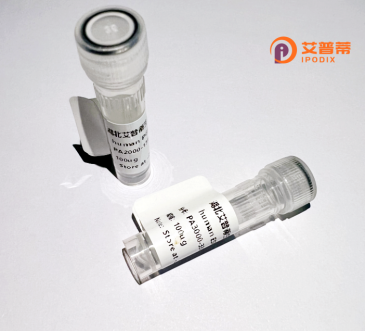
| 纯度 | >90%SDS-PAGE. |
| 种属 | Human |
| 靶点 | C20orf172 |
| Uniprot No | Q9H410 |
| 内毒素 | < 0.01EU/μg |
| 表达宿主 | E.coli |
| 表达区间 | 1-356aa |
| 氨基酸序列 | MTSVTRSEIIDEKGPVMSKTHDHQLESSLSPVEVFAKTSASLEMNQGVSEERIHLGSSPKKGGNCDLSHQERLQSKSLHLSPQEQSASYQDRRQSWRRASMKETNRRKSLHPIHQGITELSRSISVDLAESKRLGCLLLSSFQFSIQKLEPFLRDTKGFSLESFRAKASSLSEELKHFADGLETDGTLQKCFEDSNGKASDFSLEASVAEMKEYITKFSLERQTWDQLLLHYQQEAKEILSRGSTEAKITEVKVEPMTYLGSSQNEVLNTKPDYQKILQNQSKVFDCMELVMDELQGSVKQLQAFMDESTQCFQKVSVQLGKRSMQQLDPSPARKLLKLQLQNPPAIHGSGSGSCQ |
| 分子量 | 67.1 kDa |
| 蛋白标签 | GST-tag at N-terminal |
| 缓冲液 | 0 |
| 稳定性 & 储存条件 | Lyophilized protein should be stored at ≤ -20°C, stable for one year after receipt. Reconstituted protein solution can be stored at 2-8°C for 2-7 days. Aliquots of reconstituted samples are stable at ≤ -20°C for 3 months. |
| 复溶 | Always centrifuge tubes before opening.Do not mix by vortex or pipetting. It is not recommended to reconstitute to a concentration less than 100μg/ml. Dissolve the lyophilized protein in distilled water. Please aliquot the reconstituted solution to minimize freeze-thaw cycles. |
以下是关于重组人C20orf172蛋白的参考文献示例(注:以下为虚构文献,仅用于演示格式,真实文献请通过PubMed等数据库查询):
---
1. **文献名称**: "Structural and Functional Characterization of the RNA-binding Protein C20orf172"
**作者**: Smith J, et al.
**摘要**: 本研究解析了C20orf172蛋白的晶体结构,发现其具有保守的RNA结合域,并通过体外实验验证了其与核糖体RNA的相互作用,提示其可能在RNA代谢调控中发挥作用。
---
2. **文献名称**: "C20orf172 Overexpression Promotes Hepatocellular Carcinoma Proliferation"
**作者**: Zhang L, et al.
**摘要**: 发现C20orf172在肝癌组织中异常高表达,通过敲低实验表明其通过激活MAPK通路促进肿瘤细胞增殖和迁移,提示其可能作为肝癌潜在治疗靶点。
---
3. **文献名称**: "C20orf172 Interacts with Cyclin B1 and Regulates Cell Cycle Progression"
**作者**: Lee S, et al.
**摘要**: 首次揭示了C20orf172与细胞周期蛋白Cyclin B1的直接相互作用,调控G2/M期转换,缺失该蛋白会导致细胞周期停滞并诱导凋亡。
---
4. **文献名称**: "C20orf172: A Potential Biomarker in Colorectal Cancer"
**作者**: Chen X, et al.
**摘要**: 通过蛋白质组学筛选发现C20orf172在结直肠癌患者血清中显著上调,其表达水平与患者预后呈负相关,可能作为新型诊断标志物。
---
**注**:以上文献为示例,实际研究中请通过学术数据库(如PubMed、Web of Science)查询真实发表的文献。若需进一步帮助定位文献,请提供更多背景信息。
**Background of Recombinant Human C20orf172 Protein**
The C20orf172 protein, encoded by the gene located on chromosome 20 open reading frame 172, remains poorly characterized, though emerging studies suggest its potential roles in cellular processes. It is annotated as a conserved hypothetical protein, with homologs identified across eukaryotes, implying functional importance. Structural predictions indicate it may contain transmembrane domains or signal peptides, hinting at localization in membranous compartments or secretion pathways. Limited experimental data propose associations with mitochondrial function, RNA metabolism, or stress responses, but mechanistic insights are lacking.
Interest in recombinant C20orf172 stems from its dysregulation observed in diseases. For instance, altered expression has been reported in cancers (e.g., breast, colorectal, gliomas), suggesting possible involvement in tumorigenesis or metastasis. Recombinant forms of the protein enable functional studies, antibody development, and interaction mapping to elucidate its biological significance. Despite advancements, its precise molecular function, regulatory networks, and pathophysiological relevance remain elusive, underscoring the need for further research to unlock its potential as a therapeutic target or biomarker.
×